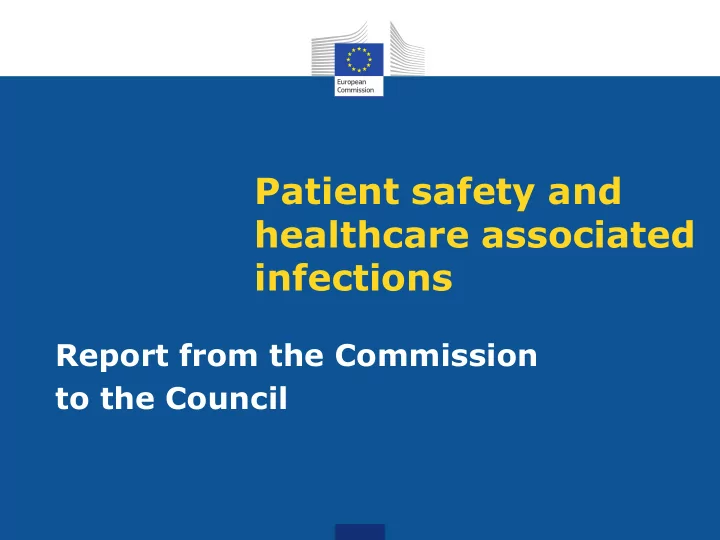

Patient safety and healthcare associated infections Report from the Commission to the Council
Council Recommendation 2009/C 151/01 • Actions for Member States: • Develop national policies on patient safety • Inform and empower patients • Establish reporting and learning systems on adverse events • Promote education and training for health workers • Adopt and implement a strategy to prevent and control healthcare associated infections • Actions for EU collaboration: • Classify and measure patient safety • Share knowledge and experience • Develop and promote research
Council Recommendation 2009/C 151/01 • The Council invites the Commission to produce an implementation report to the Council • assessing impact of this Recommendation, on the basis of the information provided by Member States, • to consider the extent to which the proposed measures are working effectively, and • to consider the need for further action.
The Report is based on: Replies from Member States to a standardized questionnaire Replies to a public consultation (181 replies received mainly from health professionals, hospitals and patients organisations) Eurobarometer survey on patient safety and quality of care carried out in 28 Member States
MS questionnaire Implementation by actions at MS level education of health professionals reporting and learning systems fully implemented partly implemented not implemented patient empowerment policies and programmes 0 2 4 6 8 10 12 14 16 18 20 22 24 26 28
MS questionnaire Implementation by countries 13 12 11 10 9 8 7 6 5 4 3 2 1 0 AT BE BG CY CZ DE DK EE EL ES FI FR HR HU IE IT LT LU LV MT NL NO PL PT RO SE SI SK UK
Implementation at EU level • Classify and measure patient safety Co-financing of the Health Care Quality Indicators Project led by OECD Agreement with WHO on delivering EU patient safety taxonomy • Share knowledge and experience EU expert group on patient safety and quality of care Co-financing of the EU network on patient safety and quality of care • Develop and promote research Co-financing of projects within the Health Programme and research programme FP7
Eurobarometer: citizens' perception No change since 2009' perception
Eurobarometer: patients' experience
Eurobarometer Europeans are most likely to take general reputation (38%) and the opinions of other patients (31%) into account when assessing the quality of a hospital
Impact of the Recommendation • According to Member States: • Increased awareness at political level and trigerred concrete actions, e.g. development of patient safety strategies and programmes, inclusion of patient safety in health legislation • Increased awareness at healthcare setting level • According to stakeholders: • Contributed to improving patient safety • Raised awareness at political level
Public consultation
Public consultation
Public consultation
Progress made, more needed Awareness raised at political level, patient safety embeded in national policies and legislation Good climate to improving patient safety in the EU Patients better aware of possibilities of reporting adverse events BUT Lesser impact at healthcare setting level No systematic follow-up of reported adverse events Citizens still not confident about quality and safety of healthcare
Suggested follow-up measures 1. A common definition of quality of care and support for common terminology, common indicators and research on patient safety; 2. EU collaboration on patient safety and quality of care; 3. Guidelines on how to provide information to patients on quality of care; 4. EU guideline on how to build patient safety and quality of care standards; 5. Reflection on the issue of redress as provided for in Directive 2011/24/EU); 6. Encouraging training for patients, families and informal carers; 7. Encouraging reporting as a tool to spread a patient safety culture.
Recommend
More recommend